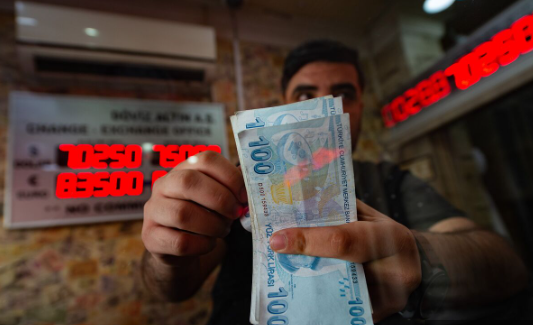Winter is upon us, one more time, along with perennial worries about currency shocks, which had in the past mostly occurred in cold winter days, wiping off wealth and stoking inflation. In as much as I have a well-deserved reputation for being the old, grizzly perma-bear of all TL assets, logic and data lead me to conclude that Turkey will spend a calm winter regarding the exchange rate.
Put differently, the “crawling peg” or “TL reel appreciation” policy invented by Mehmet Simsek and Gaye Erkan appears sustainable until end-March 2024 municipal elections. What happens afterwards is still murky, so I’ll treat that future in another article. But regardless of how local elections turn out, one of most-touted myths about TL, subject of countless YouTube commentaries, namely a precipitous decline in TL is simply not in the cards.
At this juncture, the presence of too many moving parts blurs the forecast horizon. Therefore it is paramount to make clear the assumptions on which I base my cautiously optimistic forecast:
⦁ A moderate contraction in the current account deficit in the 4Q2023-1Q2024 period compared to the same period of the previous year.
⦁ CBRT will increase the policy rate to 40% at the end of the year and await local election results to set course for later.
⦁ In this scenario, the simple pre-tax interest on 1-month deposits peaks around 50%, consumer loan interest rates peak around 70%, and corporate loans peak around 60%.
⦁ Official CPI peaks at around 70% before March.
⦁ New year wage, salary and retirement increases will remain between 30-40% annually.
⦁ In the mentioned period, outflows from KKM (The FX protected deposit insurance scheme) won’t exceed TL400 billion.
⦁ Foreign debt rollover ratio of the banking and non-financial sector remains around 93%, as observed in the September balance of payments.
⦁ $4 billion of the total $11.5 billion committed by the UAE will enter the Treasury-CBRT coffers.
Until end-March elections, we will live in a world where the monthly depreciation of TL against USD will be 1.5-2 points below the CPI.
WHY?
First, the sensitivity of outflows from KKM to exchange rates or inflation is not very high. The division of outflows mostly reflects the priority of portfolio optimization. In other words, those who switch from TL to KKM return to TL, while others return to foreign currency. This flow dynamic means that the CBRT will a modest amount of its FX reserves during the winter months. However, with existing reserves and additional financing from the UAE, there will be no meltdown in the CBRT’s net foreign assets to the extent that would trigger high net worth savers to flee to foreign currency or the proverbial “under their pillow”.
Our readers will question WHY KKM holders will remain in TL, or why the fresh savings entering the system will largely be directed to TL, in an environment where CPI has risen to 70% or above and for the “woman on the street” inflation is 10-15 points above the official rate. The answer is simple. Last week, the CBRT absorbed the stray liquidity circulating in the market and started funding the market, meaning that it now has a firmer control on monetary policy levers.
Thus, it can pursue its objective of raising deposit interest rates to render TL assets attractive to residents. Currently, the gap between the CBRT policy rate and the average 1-month deposit is around 10 points. If this spread increases to 12-15 points, the annual compound interest return of those who make monthly deposits will be equivalent to a net 55%, which in my opinion will be enough to keep a significant amount of savings in TL.
The probability of this basic scenario is around 60%, but in Turkey there is always room for bad news. Where can I go wrong? Let’s list the basic elements of a hypothetical bad-case scenario:
⦁ As a result of the Middle East clashes or Ukraine war “contaminating” energy markets in general, Brent oil rises to $100/barrel or above, pushing natural gas prices up. Brent remains elevated at these levels for at least 6 months. This scenario would mean death for the Turkish economy.
⦁ The understanding that the Fed will not cut interest rates throughout 2024, the stumbling of the Chinese economy, or the escalation of US-China tensions in addition to the two items mentioned above will create geopolitical risk pricing in risky assets. It becomes difficult for developing countries with low credit scores, such as Turkey, to access the global credit market and the roll-over rate decreases.
- CHP Istanbul Ekrem İmamoğlu will be banned from politics, or we will experience a political turmoil that even residents cannot ignore. There will be a silent run on FX deposits, or further dollarization.
By Atilla Yesilada
Follow our English language YouTube videos @ REAL TURKEY: https://www.youtube.com/channel/UCKpFJB4GFiNkhmpVZQ_d9Rg
And content at Twitter: @AtillaEng
Facebook: Real Turkey Channel: https://www.facebook.com/realturkeychannel/
